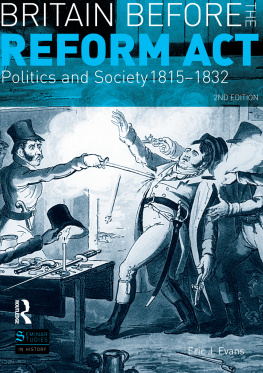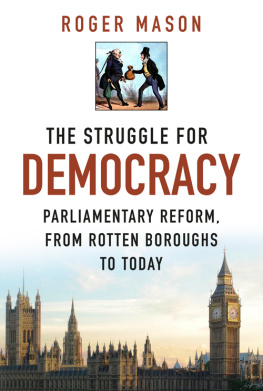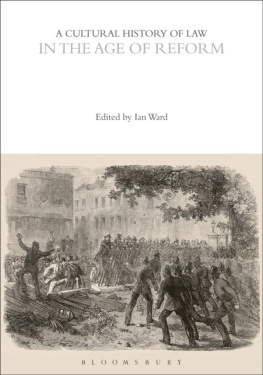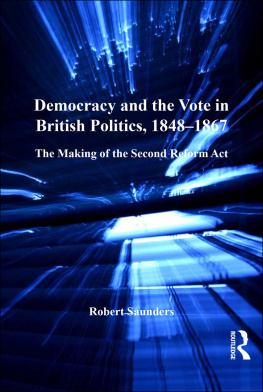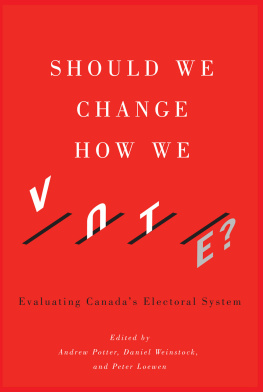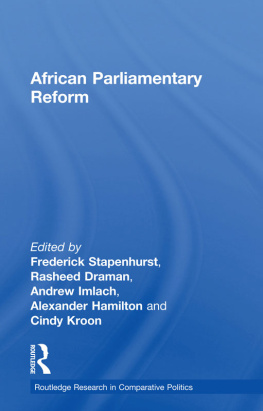Parliamentary Reform in Britain, c. 17701918
ERIC J. EVANS
First published 2000 by Pearson Education Limited
Published 2013 by Routledge
2 Park Square, Milton Park, Abingdon, Oxon OX14 4RN
711 Third Avenue, New York, NY 10017, USA
Routledge is an imprint of the Taylor & Francis Group, an informa business
Copyright 2000, Taylor & Francis.
The right of Eric J. Evans to be identified as the author of this work has been asserted by him in accordance with the Copyright, Designs and Patents Act 1988.
All rights reserved. No part of this book may be reprinted or reproduced or utilised in any form or by any electronic, mechanical, or other means, now known or hereafter invented, including photocopying and recording, or in any information storage or retrieval system, without permission in writing from the publishers.
Notices
Knowledge and best practice in this field are constantly changing. As new research and experience broaden our understanding, changes in research methods, professional practices, or medical treatment may become necessary.
Practitioners and researchers must always rely on their own experience and knowledge in evaluating and using any information, methods, compounds, or experiments described herein. In using such information or methods they should be mindful of their own safety and the safety of others, including parties for whom they have a professional responsibility.
To the fullest extent of the law, neither the Publisher nor the authors, contributors, or editors, assume any liability for any injury and/or damage to persons or property as a matter of products liability, negligence or otherwise, or from any use or operation of any methods, products, instructions, or ideas contained in the material herein.
ISBN 978-0-582-29467-7 (pbk)
British Library Cataloguing-in-Publication Data
A catalogue record for this book is available from the British Library
Library of Congress Cataloging-in-Publication Data
Evans, Eric J., 1945
Parliamentary reform, c1770-1918 / by Eric J. Evans.
p. cm. (Seminar studies in history)
Includes bibliographical references and index.
ISBN 0-582-29467-3 (PPR)
1. Great Britain. ParliamentReformHistory. I.Title. II. Series.
JN521.E94 1999
328.41070409034dc21
99-20830
CIP
Set by 7 in 10/12 Sabon
CONTENTS
Such is the pace of historical enquiry in the modern world that there is an ever-widening gap between the specialist article or monograph, incorporating the results of current research, and general surveys, which inevitably become out of date. Seminar Studies in History are designed to bridge this gap. The series was founded by Patrick Richardson in 1966 and his aim was to cover major themes in British, European and World history. Between 1980 and 1996 Roger Lockyer continued his work, before handing the editorship over to Clive Emsley and Gordon Martel. Clive Emsley is Professor of History at the Open University, while Gordon Martel is Professor of International History at the University of Northern British Columbia, Canada and Senior Research Fellow at De Montfort University.
All the books are written by experts in their field who are not only familiar with the latest research but have often contributed to it. They are frequently revised, in order to take account of new information and interpretations. They provide a selection of documents to illustrate major themes and provoke discussion, and also a guide to further reading. The aim of Seminar Studies is to clarify complex issues without over-simplifying them, and to stimulate readers into deepening their knowledge and understanding of major themes and topics.
Readers should note that numbers in square brackets [5] refer them to the corresponding entry in the Bibliography at the end of the book (specific page numbers are given in italics). A number in square brackets preceded by Doc. [] refers readers to the corresponding item in the Documents section which follows the main text.
As in other aspects of life, fashions in historical writing change. Not so long ago, it was possible to write about parliamentary reform in the nineteenth and early twentieth centuries by concentrating on the Acts themselves. The causes of each would be dutifully considered, the terms written down in as much detail as the scope of the book required, and the consequences for political parties and other aspects of high politics analysed. In much of the early writing, also, the implicit (and sometimes explicit) assumption was that, in explaining the causes and consequences of parliamentary reform, one was also charting progress. The story revealed the emergence of a parliamentary democracy, as each Act extended the franchise and, in some way or other, made votes more equal and voting fairer. It was perfectly possible to approach democracy by citing some of the key dates which are found in the chronology: 1832, 1867, 1872, 188385, 1918, 1928, and so on. Britains advanced system of government, which guarantees that mechanisms exist for the peaceful and orderly transfer of power, emerged in stages and could be held up as an example to others.
At the height of Britains power and influence in world affairs in the late nineteenth and early twentieth centuries, indeed, imperial statesmen saw it as one of their main duties to educate those fortunate enough to have been born in the empire on which the sun never sets in the virtues of representative government. This was Britains main beneficent legacy not only to Kiplings famous, though ironically intended, lesser breeds without the law, but also to its European neighbours. Britain had, after all, managed this subtle transformation without revolution; most of them had not. Historians of the early twentieth century rarely presented analyses as starkly or crudely as this, but important studies such as J. R. M. Butlers The Passing of the Great Reform Bill [48] and G. S. Veitch, The Genesis of Parliamentary ).
Emphases have radically changed. First, history writing in a more cynical and less self-confident age no longer seeks to chart progress from a lesser to a greater state, not least because late twentieth-century society has become much more ambivalent about what constitutes progress. Secondly, much more attention was given to continuities rather than change. Thus, for example, the 1832 Reform Act in no real sense gave power to the middle classes. Britain was ruled, from Westminster at least, for two generations after it by a parliament dominated by landowners and a Cabinet whose members remained predominantly aristocratic. As Hanham put it in 1969, Everything possible was done [in 1832] to preserve the continuity of the great landed interests, which has dominated British politics since the seventeenth century [10 p. 12]. Similarly, although the 1867 and 1868 Reform Acts produced working-class majorities in many urban constituencies, the same political parties Liberal and Conservative remained the contenders for political power, at least outside Ireland with its rising nationalist party. The Labour Representation Committee was not founded until 1900; it changed its name to the Labour Party in 1906. Before the First World War, this supposedly working mans party clung desperately to the coat tails of the Liberal party for political survival.
Thirdly, much more detailed work has been done at constituency level. Not surprisingly, this work has produced findings which do not point in the same direction. On the one hand, it is now clear that a significant number of parliamentary constituencies actually




